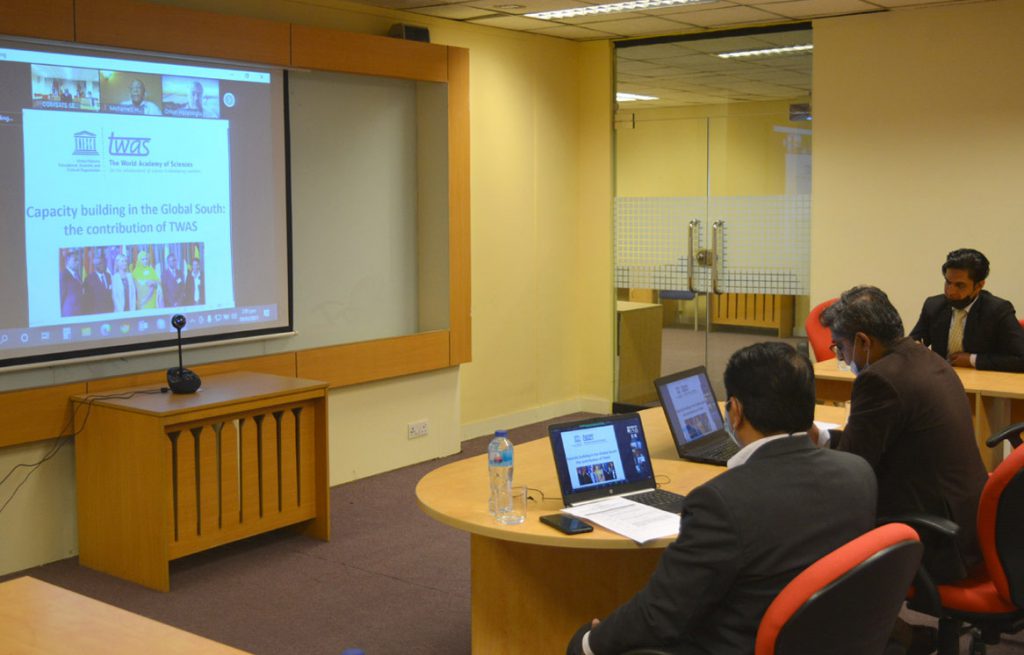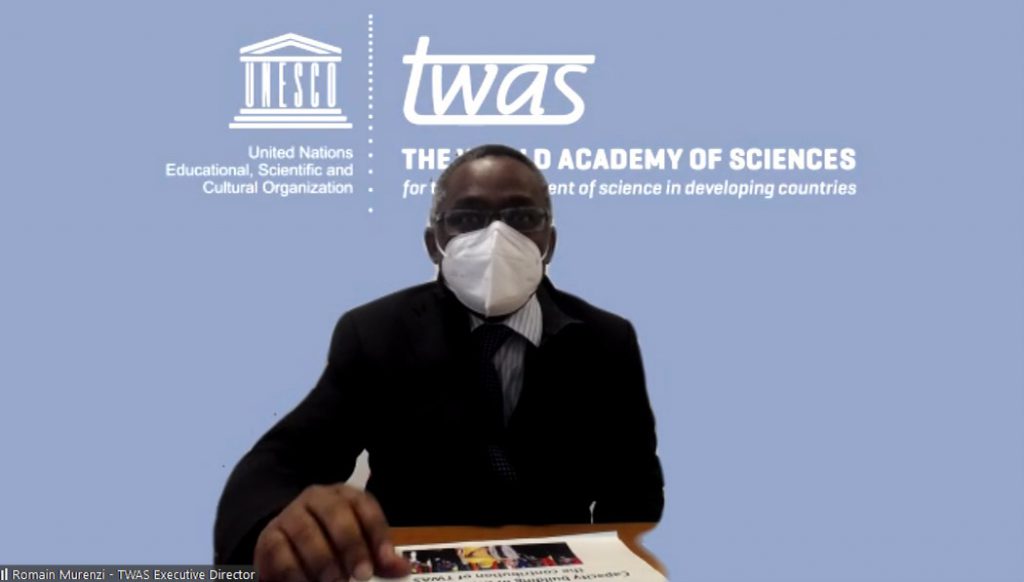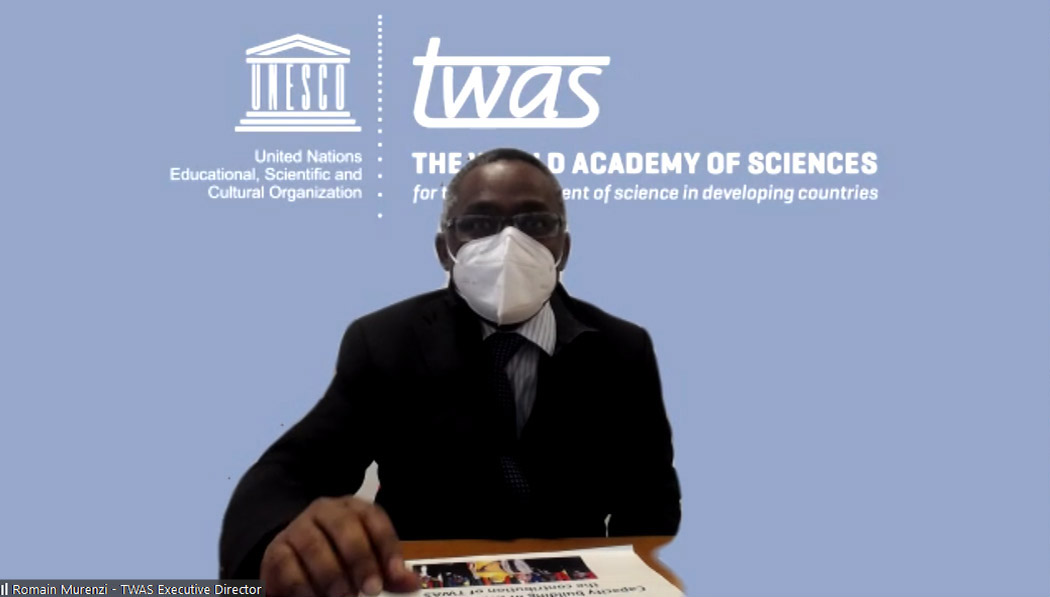COMSATS’ Lecture Series on “South – South and Triangular Cooperation for Socio-eco nomic Development in the South” continued with its eighth session on 9th March 2021, featuring talk on “Capacity building in the Global South: The Contribution of TWAS”. Delivered by Prof. Dr. Romain Murenzi, Executive Director of The World Academy of Sciences (TWAS), Italy, the talk had participation of representatives from COMSATS’ Focal Ministries, Centres of Excellence and COMSATS Secretariat.
nomic Development in the South” continued with its eighth session on 9th March 2021, featuring talk on “Capacity building in the Global South: The Contribution of TWAS”. Delivered by Prof. Dr. Romain Murenzi, Executive Director of The World Academy of Sciences (TWAS), Italy, the talk had participation of representatives from COMSATS’ Focal Ministries, Centres of Excellence and COMSATS Secretariat.
During his presentation, Prof. Murenzi shared various programmes of TWAS that have been playing a vital role in the capacity-building of scientific community, helping improve research infrastructure, supporting early-career scientists, promoting and catalyzing research links, as well as rewarding scientific excellence in the developing countries.
Informing about the details of individual programmes, Prof. Murenzi mentioned that “TWAS South-South PhD Fellowship Programme” offers 100 to 160 PhD fellowships each year for research at well-known institutions in the developing countries, including Brazil, China, India, Pakistan and South Africa. He informed that since 2004, over 700 PhD awardees have graduated with the support of TWAS and its partners, and over 1700 peer-reviewed publications have been produced by TWAS PhD graduates. Another of such programme, Postdoctoral Fellowships: South-South Mechanism, he added, supports scientists from developing countries to work collaboratively with prominent scientists in another developing country, including Brazil, India, Malaysia, Pakistan and Thailand.
![]()
In partnership with Islamic Development Bank (IsDB) and Swedish International Development Cooperation Agency (SIDA), TWAS provides grants to individuals and research units in some developing countries for specialized equipment, consumable supplies, etc.
It was learnt that ‘TWAS Exchange Programme’ is facilitating scientific exchanges and mobility in partnership with Deutsche Forschungsgemeinschaft (German Research Foundation, DFG), UNESCO, Italian National Agency for New Technologies, Energy and Sustainable Economic Development (ENEA), COMSATS University Islamabad, Accademia Nazionale dei Lincei, and Scuola Internazionale Superiore di Studi Avanzati (SISSA), among others.
Prof. Murenzi also informed that TWAS recognizes excellence in scientific research in the deve loping world through various awards, such as: TWAS – Lenovo Science Award; TWAS Awards; TWAS-Siwei Cheng Award in Economic Sciences; TWAS Medal Lectures; TWAS-C.N.R. Rao Award; TWAS-Atta-ur-Rahman Award; TWAS-Al-Kharafi Award; TWAS-Abdool Karim Award; TWAS–S.Omar Innovation for Sustainability Award; TWAS-CAS Young Scientists Award for Frontier Sciences; TWAS-Mohammad A. Hamdan Award; and TWAS Regional Awards.
loping world through various awards, such as: TWAS – Lenovo Science Award; TWAS Awards; TWAS-Siwei Cheng Award in Economic Sciences; TWAS Medal Lectures; TWAS-C.N.R. Rao Award; TWAS-Atta-ur-Rahman Award; TWAS-Al-Kharafi Award; TWAS-Abdool Karim Award; TWAS–S.Omar Innovation for Sustainability Award; TWAS-CAS Young Scientists Award for Frontier Sciences; TWAS-Mohammad A. Hamdan Award; and TWAS Regional Awards.
It was also mentioned that TWAS Young Affiliates Network (TYAN) initiative, started in 2007, is promoting scientific cooperation through research on emerging diseases, climate change, food and water safety, preservation and utilization of biodiversity, etc.
Concluding his lecture, Prof. Murenzi stated that present times require effective partnerships between scientists, policymakers and diplomats to help deal with variable challenges. In this connection, TWAS in collaboration with the American Association for the Advancement of Science (AAAS) is leading a programme that includes lectures, workshops, courses and prizes to help build a bridge between the worlds of science and diplomacy.






